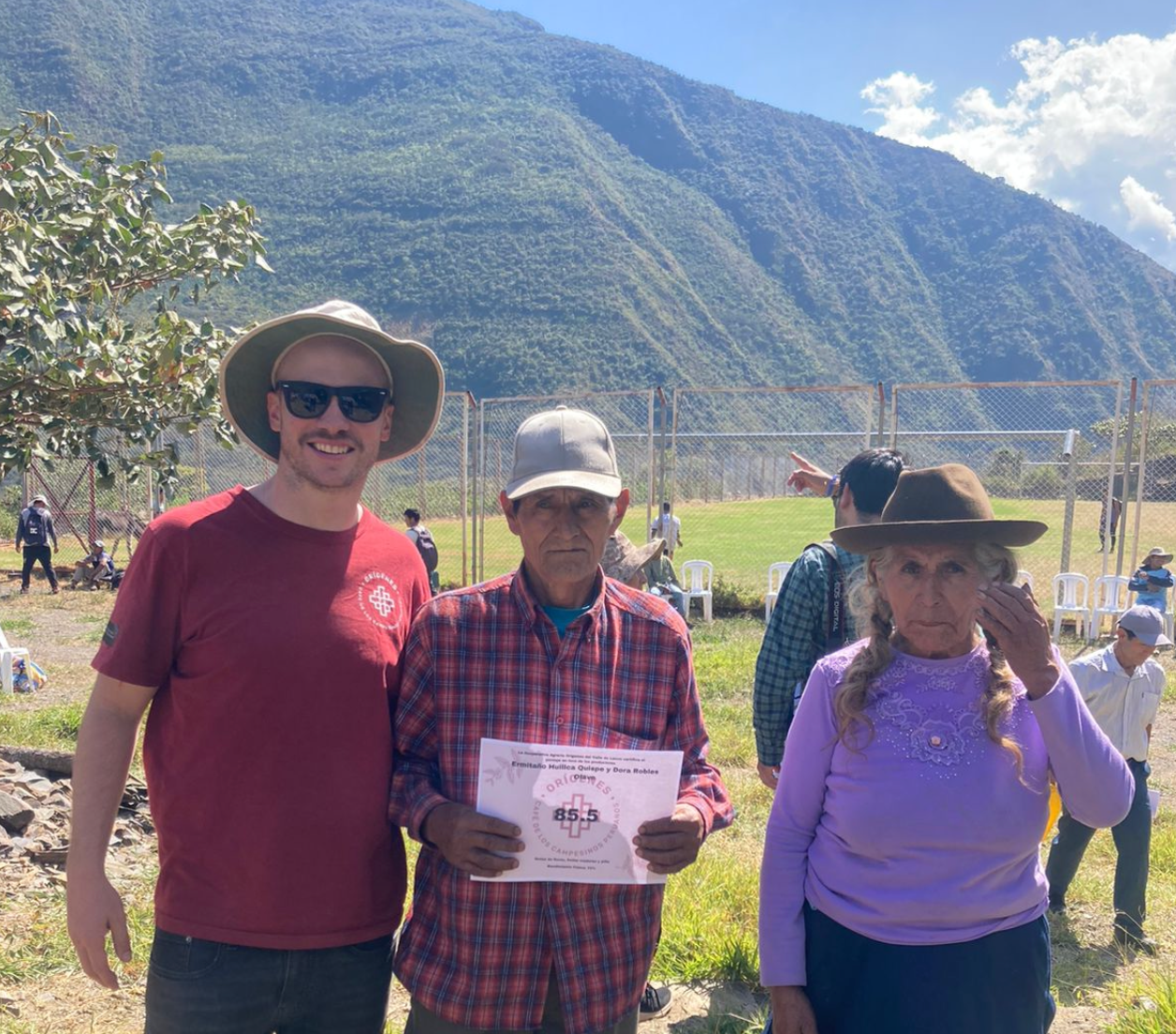
We learned a lot working with Café Orígenes, and we thought that we should share our experience, and lessons learned, with you. This year, we bought two of our new favorite coffees from this cooperative: A single farm lot produced by coop members Ermitaño Huillca Quispe and his wife Dora Robles Olave, along with a larger community lot, which we'll be using in a couple of our dark roast blends, Stag Espresso Blend and Bonfire Blend.
These coffees means a lot to us, for several reasons. They're delicious, come from a cooperative with a mission, vision and values that align closely with how we try to run Dapper & Wise, they're one of the most direct trade coffees we've ever roasted, and because of this deeper level of communication that we're fortunate to have with this cooperative, it feels like we just took a crash course in coffee buying, leaving us with a wider perspective, and more tools, that we can now use to rethink and hopefully improve the supply chains of every coffee we purchase.
Let's start with some of the technical details about these coffees. The coffees that make up these lots are grown on ~1.5 hectare farms at an altitude of roughly 1,850 meters above sea level (masl) in Cusco, Peru, alongside citrus, cherimoya, and granadilla (in the passionfruit family) plants. They're made up of typica, bourbon and catimor varieties, which tend to be processed directly on the farms they're grown on. In Ermitaño's and Dora's case, the cherries are picked ripe, pulped, and then fermented for 48 hours in tanks, after which they're carefully dried on raised beds.
These coffees come to us from Café Orígenes - a relatively new cooperative, founded in 2021 by coffee farmers in the region and The Andean Alliance for Sustainable Development, an NGO that supports community-led development in Peru. Our relationship with this cooperative began in 2022, when our Director of Coffee, Joey, met the coop's manager, Luke. Once they got to talking, they learned that not only do they (along with Dapper & Wise and Café Orígenes) share a lot of the same philosophies about the coffee industry, but that our roastery (a buyer) and their cooperative (a seller) can turn this friendship into a business relationship, and collaborate to create a mutually beneficial supply chain.
One way that a lot of roasters buy coffee is by working directly with a rep at an importing company. In this case, the importer buys the coffee, imports it, stores it in a warehouse, and finally, sells it to roasters. One way to think of this, kinda standard, way of buying coffee is that the importer has a relationship with a coffee producer, producing group, exporter, etc. and also has a relationship with roasting companies, and the importer's role is to connect their relationship on one end of the supply chain to their relationship on the other end. (In a better-case version of this scenario, the importer is a value-driven company that's doing more than simply buying and selling coffee for profit, but actively working collaboratively with the producers in their network to ensure they're compensated fairly for their product.)
In our opinion, this can be a win/win all around, but what we're learning is that being able to directly chat with the producer and/or producer group can help us learn more about the needs, perspectives, goals, worries, etc. of those situated at the other end of the supply chain, as well as share our perspective. And this, in turn, give us the opportunity to make this relationship a little more meaningful than a simple transaction. And we're stoked that we were able to do that for these coffees.
In this case, we worked with Mercanta, who we've been working with in this kinda standard way since we began roasting back in 2012. However, in this case, instead of only chatting with Mercanta, Café Orígenes had a seat at the table. Or, better put, we all sat down at the same table, instead of a two table convo in which Mercanta and Café Orígenes sit at one, and Mercanta and DW sit at the other. Again, nothing inherently wrong with having 'two tables', but we were excited to be able to keep things open and transparent at one table. After discussing things like quality, volume and timeline stuff, we arrived at the topic of pricing, and here is where we learned a little bit more about cashflow, financing and warehouse fees.
Cafe Orígenes needs to get paid a good price so that they can pay their farmer members a good price. In addition, Mercanta needs to get paid a good price for the service they offer (importing, ocean freight, financing, insurance, warehouse fees, etc). We at Dapper & Wise, as the final buyer, have to make sure that we remain profitable in order to continue operating a sustainable business, and the truth to this is that if coffee prices get too high, they either become unsustainable for us, and/or we take the opportunity to see if we can get creative and make things work. By sitting at the same table together, we were able to easily learn and communicate each of our financial needs, limitations, capabilities and concerns and land on a price that works for all parties involved.
Starting with the cooperative's asking price, then adding in Mercanta's costs and margin, we arrived at Dapper & Wise's price. While this price was immediately doable/sustainable for us, after learning a little bit about Mercanta's financial considerations, we realized that we might be able to simplify the supply chain, resulting in less steps and services, allowing us to avoid unnecessary costs, without affecting the price that Orígenes receives, nor Mercanta's margin*
(*One note here is that by having our own direct relationship with Orígenes, instead of leveraging a relationship between importer and producer, which might be the case in the more standard version of things, and by committing well in advance to the purchase of this coffee (with a signed contract!), Mercanta is effectively less involved. They absorb less risk having a dedicated buyer, and since we are in direct communication with Orígenes, Mercanta doesn't need to dedicate as much time and energy to this relationship as they otherwise might have to. Because of this, Mercanta's margin in this particular transaction might be smaller than if we bought and worked solely with Mercanta throughout this process.)
What we ended up doing was simply taking possession of (aka 'paying for') all the coffee as soon as it arrived to the USA, and we worked with Mercanta to arrange a streamlined payment plan. The result - we were able to minimize financing and warehouse fees, which in turn lowered Mercanta's operational costs for their services, resulting in a lower price for DW without affecting the price paid to Orígenes.
For context, what we've historically done with larger volume lots like this (and I think this is often a characteristic of the standard way of doing things outlined above) is pay as we go. For instance - if the entire lot has 100 bags, and we need 10 bags per week, the importer remains the owner of the entire lot of coffee, which sits in their account at an external warehouse. Each week, as we need more coffee, we place 10 bag orders to the importer and pay for just those 10 bags at a time, leaving the remainder of the coffee in the importer's possession. The importer is usually responsible for covering warehouse fees for the duration of time that the coffee sits in a warehouse, along with more warehouse 'outbound' fees every time we place an order. While some importers might help cover these costs, these costs are often included to some degree in the price that importers charge roasters for the coffee.
So, by taking possession of this lot right away, and working with Mercanta to find an expedited payment plan, we were able to trim off a good chunk of these warehouse and financing fees. (We also had to learn how to open our own account in an external warehouse and familiarize ourselves with all the warehouse fees associated with coffee storage, but we'll spare you those boring details.) The tl;dr here is that IF your company has the cashflow to pay for coffee that you might not be ready to roast and sell for a while, AND you strategically/intentionally manage your warehouse inventory, paying warehouse fees for coffees in your own account can be much cheaper than having these costs built into your green coffee contracts with importers. There's gotta be countless exceptions and nuances here, so definitely do your research and keep the dialogue open with your partners to learn what options you have.
It's also worth noting that this approach is not super profound nor is it anything new. (In fact, we just did something very similar to this with Darabiel Orosio's coffee and the help of the importer Shared Source.) This is a strategy that many roasters have been doing for years, but nonetheless, we're super proud and excited to have also figured this out and implemented it successfully for one of our largest volume lots of coffee. For us, it symbolizes a step forward in our coffee buying, helping us to understand the big picture a little better, as well as our role in the industry.
Every coffee's journey from farm to roaster looks a little unique, so this is not something that be utilized across the board. But as green prices continue to rise, along with the cost of running a business in general, it's important that we fill our toolbox with whatever tools we can so that we can remain a sustainable business and continue working with (and paying fair prices to) the farmers who grow the coffee we turn brown, along with the companies that help get it to us.
If you're a roaster, and lookin to buy this coffee and roast it up yourself, be sure to scope Mercanta's website for some options! Turns out Mercanta also loved this coffee and bought some for themselves to share with more roasters in their network. One option here! Another one!
